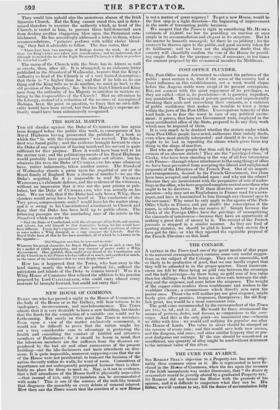POST-OFFICE PLUNDER.
THE Post-Office seems determined to exhaust the patience of the. public : most certain is it, that if the sense of the country had a
direct influence on this establishment, not a week would elapse before the Augean stable were swept of its present corruptions. But, not content with the quiet enjoyment of its privileges, as they are called—that is, its peculations—it is growing impudent, nay scandalotte. The seizing of private parcels, and inquisitorially breaking their seals and ransacking their contents, is a violation of public confidence that makes one tremble to trust a letter within the jaws of the Post-Office. Unscrupulous temerity of this kind leads us to fear the worst in ease of any political excite- ment: it proves, that here are Government tools, employed in the most confidential office of the State, prepared to do any dirty work. which may be required of them.
It is very much to be doubted whether the statute under which these Post-Office people have acted, authorizes their unholy deeds, even when most strictly interpreted : and should it do so, no time ought to be lost in repealing the clause which gives them any thing in the shape of sanction.
But who are these people that thus call for light upon the dark corners of an obscure statute? They are the "privileged class," of Clerks, who have been standing in the way of all free intercourse with France—through whose attachment to the snug things of office we have been prevented from accepting the liberal and enlightened proposals of the Directors of the French Post. Out of six import- ant arrangements, desired by the French Government, two alone have been accepted and concluded upon : and why not the others? Because they are inconsistent with the perquisites of sets of under- lings in the office, who have acquired complete control over those who ought to be its directors. Will these directors answer us a plant question—why may not an Englishman in France send for a news- paper, and have it transmitted to him through any channel open to the newsman? Why must he only apply to the agents of the Post- Office Clerks in France, and pay double the subscription of the paper, in advance, before lie can receive it? Simply because the Clerks of the Foreign Office have the privilege of monopolizing the channels of intercourse—because they have an opportunity of making a great deal of money by it. The receipt of the French journals is stopped in a similar manner. As they are fond of quoting statutes, we should be glad to know what statute they have got for this; or why they rejected the equitable proposal of the French Directors on this head.
















 Previous page
Previous page